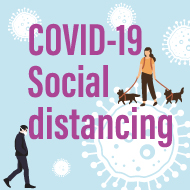
Government advice to protect the elderly and the vulnerable
The government is advising that we all take social distancing steps to reduce interaction between people to slow the transmission of COVID-19.
The guidance advises those who are at increased risk of COVID-19 to be especially stringent in following these measures. This group includes those aged 70 or over, under 70 with an underlying health condition and those who are pregnant.
The government’s advice, which is likely to be in place for some weeks, includes:
1. Avoiding contact with someone who is displaying symptoms of COVID-19. These symptoms include high temperature and/or new and continuous cough.
2. Avoiding non-essential use of public transport, varying your travel times to avoid rush hour, when possible.
3. Working from home, where possible. Your employer should support you to do this. Please refer to employer guidance for more information.
4. Avoiding large gatherings, and gatherings in smaller public spaces such as pubs, cinemas, restaurants, theatres, bars, clubs.
5. Avoiding gatherings with friends and family. Keep in touch using remote technology such as phone, internet, and social media.
6. Using telephone or online services to contact your GP or other essential services.
The government states: “Everyone should be trying to follow these measures as much is pragmatic”.
For more information and guidance on social distancing in the UK, please visit www.gov.uk



 The latest
The latest